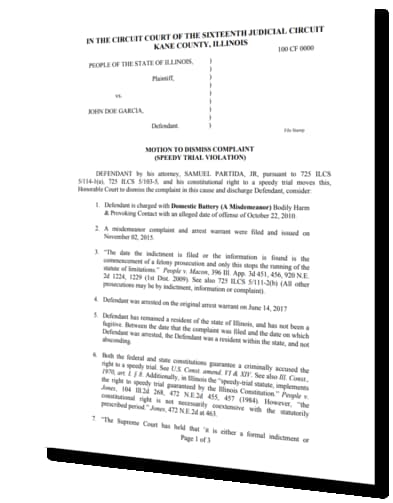In a criminal case a defendant may file a motion to dismiss the charges. Although rarely granted, a defendant has the right to file the motion and make an argument for dismissal under certain conditions.
In Illinois the Code of Criminal Procedure, under 725 ILCS 5/114-1, grants authority to file a Motion to dismiss charge. The section provides that;
(2) The prosecution of the offense is barred by Sections 3-3 through 3-8 (joinder, double jeopardy, statute of limitations) of the Criminal Code of 2012.
(3) The defendant has received immunity from prosecution for the offense charged.
(4) The indictment was returned by a Grand Jury which was improperly selected and which results in substantial injustice to the defendant.
(5) The indictment was returned by a Grand Jury which acted contrary to Article 112 of this Code and which results in substantial injustice to the defendant.
(6) The court in which the charge has been filed does not have jurisdiction
(7) The county is an improper place of trial.
(8) The charge does not state an offense.
(9) The indictment is based solely upon the testimony of an incompetent witness.
(10) The defendant is misnamed in the charge and the misnomer results in substantial injustice to the defendant.
(11) The requirements of Section 109-3.1 (preliminary examination or indictment) have not been complied with.”
Due Process Violation Is An Additional Grounds For Dismissal

There is one additional grounds for dismissal not listed in § 114-1(a).
“The due process rights of a defendant may be violated if the prosecutor deliberately or intentionally misleads the grand jury, uses known perjured or false testimony, or presents other deceptive or inaccurate evidence.” People v. DiVincenzo, 183 Ill. 2d 239, 257 (1998).
However, to permit the dismissal of an indictment, the denial of due process must be unequivocally clear (People v. Hart, 338 Ill. App. 3d 983, 991 (2003)), and the prejudice must be actual and substantial (People v. Torres, 245 Ill. App. 3d 297, 300 (1993)).
Can The State Refile Charges?
See also Dismissed With Prejudice In Illinois.
The Illinois Code of Criminal Procedure determines if the dismissal is with or without prejudice. 725 ILCS 5/114-1. Motion to dismiss charge, makes it clear that recharging is allowed after some dismissals. See the language below:
Sometimes Recharging Is Not Allowed
Other more serious violations are presumed to be dismissals with prejudice and recharging is not allowed. These include dismissals because of violations in…
- Speedy trial rights
- Improper joinder
- Double jeopardy issues
- Statute of limitations error
- Immunity agreement violations
Sample Motion To Dismiss Criminal Charges
There is no magic formula outlining what a motion to dismiss should look like. Like most criminal law motions it should track the language in the statute that authorizes the motion and should at a minimum include:
- A clear statement of what your asking the court to do
- Citations to the statute that allow you to ask what your asking for
- Citations to relevant case law that provide further authority for what your asking for
- The specific facts unique to your case that are relevant to the motion
Judge Has To Decide To Grant Or Deny Your Motion To Dismiss
Just because you file a motion to dismiss doesn’t mean charges are being dismissed.
It’s pretty tough to convince a judge that dismissal of charges is warranted. However, that doesn’t mean it’s impossible. The filing of the motion simply puts the judge and the prosecution on notice that you are formally asking for a dismissal.
The written motion to dismiss is merely the pleading for the hearing that you’ll have on the issue…
See Also These Examples Of When To File A Motion To Dismiss In A Criminal Case
- Motion To Dismiss Based On Prosecutorial Delay (The Lawson Rule)
- Procedure For Filing A Motion To Dismiss When The Charging Instrument Is Insufficient
- What To Do About Fatally Flawed Criminal Charges (Maybe You Shouldn’t File The Motion To Dismiss)
- Defendant Waited For The Trial To Begin So He Had To Show Prejudice To Win A Dismissal
- Prosecutors Refusal To Name The Victim In The Indictment Got The Charges Dismissed
- DUI Dismissed After State Trooper Consistently Refuses To Come To Court
- Speeding Ticket Dismissed Due To Illinois Supreme Court Rule 552 Violation
- Speedy Trial Violation Leads To A Motion To Dismiss That Is Granted
- A Double Jeopardy Violation Means You Better File A Motion To Dismiss
- Sloppy Police Testimony In The Grand Jury Room May Lead To A Dismissal Of The Charges
- Failure To Accurately Charge A Defendant May Lead To Dismissal Of The Charges
See Also
- People v. Chatman, 297 Ill.App.3d 57 (2nd Dist. 1998) (improper for judge to dismiss indictment outside the parameters of the statute)
- People v. Hall, 194 Ill.2d 305 (2000) (issues of fact relevant to a motion to dismiss must be addressed in hearing on the motion to dismiss)

 Samuel Partida, Jr. is now prosecuting criminal law cases in an Illinois county near you. He is, therefore, unavailable to answer questions on this site. Always remember, there is no substitute for steady, persistent attention to the cases.
Samuel Partida, Jr. is now prosecuting criminal law cases in an Illinois county near you. He is, therefore, unavailable to answer questions on this site. Always remember, there is no substitute for steady, persistent attention to the cases.
Where department would I find a “Traffic Ticket” filed in a Court House?
Jane Johnson 224-723-2882
This provides a clear overview of the grounds for filing a motion to dismiss in Illinois criminal cases. It’s informative about the process and the requirements for such motions. Overall, it highlights the importance of due process and the legal avenues available to defendants.